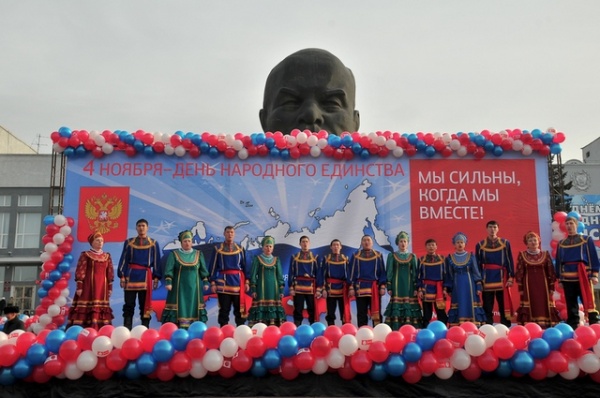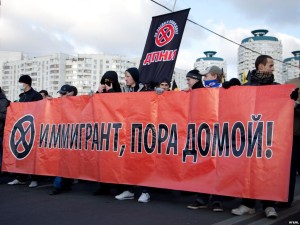On November 4, Russians celebrated the newest national holiday, the Day of National Unity.
The holiday was established by a decree by President Vladimir Putin in 2005, replacing the Soviet celebration of The Day Of The Great October Socialist Revolution.
The Day of National Unity celebrates the expulsion of Polish troops from Moscow in 1612 and the end of the Time of Troubles, the period after the fall of the Rurik Dynasty in 1598. It is a narrative of how all classes of Russian society joined together to expel the “alien Polish invaders” from the capital.
The Rise of Ultra-Nationalism
(Caption: “Immigrant, it’s time for you to go home!”)
Critics — including those hostile to Putin and the Kremlin — say that National Unity Day is similar to Soviet propaganda and that it promotes xenophobia and ultra-nationalism.
The holiday blurred the boundary between those celebrating pride and identity and those — including some among the thousands of nationalists marching in Moscow last week — who chanted slogans against immigrants and foreigners. Pro-Kremlin outlet Russia Today, which puts a quietly positive spin on its report, writes that 8,000 people were in the Moscow rally:
Many of them were wearing black balaclavas, waving black, yellow, and white nationalist flags, and chanting, “Russians Unite!” Organizers initially expected up to 15,000 to attend the march.
Demonstrators displayed banners of a nationalist nature, calling for migrants to return to their home countries. Some of the banners read: “Russia for Russians” or “Today mosque – tomorrow jihad”.
RT adds that some people were arrested for what it described as “minor” offenses, such as “wearing masks, shouting out Nazi slogans, and using banned symbols”.
Other media painted a less rosy picture of National Unity Day. Komsomolskaya Pravda reporting that ultranationalists had killed three migrants — including a Kirghiz man and an Uzbek — in St Petersburg, amid “massive violations”, a mass brawl, and arrests. Komsomolskaya Pravda wrote:
All those arrested were young people. Some of them were not even eighteen. The young have absorbed radical right-wing ideas, they went through the streets to beat migrants with complete certainty that they were right.
Excluding The Other
Even as Russian Prime Minister Dmitry Medvedev tweeted that National Unity Day showed that Russia was a large and united country, migrant workers said they had been excluded from the celebrations.
С Днем народного единства! Россия – это уникальное сочетание народов, традиций и истории. Мы разные, но мы – единая большая страна.
— Дмитрий Медведев (@MedvedevRussia) November 4, 2013
The Federation of Migrants in Russia said that the Moscow authorities had asked migrant workers not to take part in National Unity Day marches, to avoid “provocations”.
Rewriting History
With his decree for National Unity Day and the celebrations of the events of 1612, Vladimir Putin drew a deliberate parallel between the ending of the Time of Troubles in the 17th century and Russia’s recent emergence as a power, after the fall of the USSR and the traumatic years of Perestroika.
In the earlier case, after the Russians kicked the Polish invaders out of Moscow, the Romanov Dynasty took leadership, with Mikhail Romanov — persuaded by his mother — crowned as Tsar.
That birth of the Romanov Dynasty has been celebrated in the post-Soviet rebirth of Russia and the reign of Putin, including the commissioning in 2007 of a movie, 1612, which dramatises the expulsion of Polish forces from Moscow. The film’s producer, Nikita Mikhalkov, is known for his pro-Putin stance, and its director, Vladimir Khotinenko, said that “Russians have a strong desire for a Tsar“.
“And now those times are really relevant. I am talking about the period after Perestroika. We lived in a Time of Troubles. Its duration even coincided with the one in the 17th century,” Khotinenko added.
The film takes considerable dramatic license with historical events — in the movie, Russian forces manage to turn away the Polish invaders from Moscow, whereas in reality they occupied the city for two years.
But, of course, that does not necessarily matter in the construction of national identity in the 21st century.
A Victory For “Putin’s Russia”?
BBC Russian’s Alexandra Zaitseva writes that, of all the holidays of the “New Russia”, the Day of National Unity has succeeded in garnering popular support, ironically because it has been co-opted by ultra-nationalists, who use it as a vehicle for their annual “Russian March”:
Other government measures in the so-called politics of history, despite an openly-declared interest by the Russian authorities in regulating history and the memory of the past have not had such a large effect.
“The state has taken and brilliantly set up a fascist day. I do not suspect the ideologues of this holiday, those who come up with it, as desiring that, but it is a brilliant performance in the politics of history,” says Oxford University professor Andrei Zorin.
Unity may thus succeed where other themes in the post-Soviet era have failed. Zaitseva points out, “With other holidays, such as Russia Day on June 12, there are problems….Perhaps that is because, as the latest poll from the “Levada Center” shows, 22% of Russians believe that Russia’s independence ‘has gone bad’.”
What Happens when “Unity” is Not for everyone?
The premise of Putin’s Day of National Unity is uniting of Russians behind a narrative of common identity, based on the mythologizing of historical events.
In reality it excludes those who are not ethnically Russian.
What are the ramifications of this for the Russian Federation, which contains regions — particularly the North Caucasus — which are not only far from ethnically “Russian” but also have been hostile to Russian hegemony? What are the ramifications elsewhere in the post-Soviet space, particularly for those countries with a large emigration to Russia, in the wake of the recent anti-migrant riots in the southern Moscow suburb of Biruylevo?
Moscow has used the concept of “national unity” to try to project its power in problematic areas like Chechnya and Dagestan, not only by including these republics in the celebrations, but making sure that the holiday is publicly marked with lavish displays of patriotism.
The pro-Kremlin leadership in both Dagestan and Chechnya made sure they demonstrated public backing for the holiday. Ramzan Kadyrov, the head of the Chechen Republic, wrote on his popular Instagram page that the “unity of the Russian people” showed itself every time the Fatherland was threatened.
The Kremlin-appointed acting President of Dagestan, Ramazan Abdulatipov — a former Russian Ambassador to Tajikistan and an ardent critic of the 1993 decree dissolving the Soviets — said that the Day of National Unity was “one of the most important public holidays, symbolizing the main moral values of the nation — patriotism, spirituality, unity, and a sense of justice”.
The celebrations do little to mask the unrest in both republics, or the widespread fears in Russia of the North Caucasus insurgencies, increasing Islamic radicalization, and terror. Weeks earlier, a Dagestan national blew herself up on a Russian bus in Volgograd, with Chechen separatists saying the attack marked the 14th anniversary of a Russian rocket strike on Grozny. The bus bombing has led to a burst of scare stories about how “secret madrassas” in the North Caucasus could be training more female suicide bombers.
Outside the Russian Federation in former Soviet republics, there was further criticism of the growing ultra-nationalism in Russia.
In Azerbaijan, the press has been pre-occupied with the arrest of an Azeri national, Orhan Zeynalov, on suspicion of murdering a Russian man in the southern Moscow suburb of Biryulevo — a killing that led to anti-immigration riots. So, on November 4, one writer questioned the growing hostility to foreign workers from former Soviet republics.
Noting reports that migrants had been murdered during the celebrations, Akper Gasanov asserted:
Yes, after the events in Biryulevo there was a lot of talk about how some of the blame for the incident lay at the doors of our citizens, who didn’t conduct themselves quite correctly in this part of Moscow….Every person of non-Slavic appearance has the chance to become the next victim of an attack by Russian nationalists. You just have to be in the wrong place at the wrong time. In the same metro station, for example.
Moreover, it is not necessary to be an ethnic Azeri, Georgian, Armenian, Uzbek, or Tajik. It’s enough to be superficially similar to the “southern people.” And Russian citizenship does not protect you from violence. They don’t beat your passport, but your face.
For comparison, I want to let you know that since the events in Biryulevo to this day in Azerbaijan no-one has committed any such crimes. There are people of Slavic appearance calmly walking the streets of our cities. No one in Baku burst into the subway, shouting “Kill the Russians!” This will not happen. We have not been brought up that way.
(Featured image: National Unity Day Celebration — slogan “We are stronger together”)


